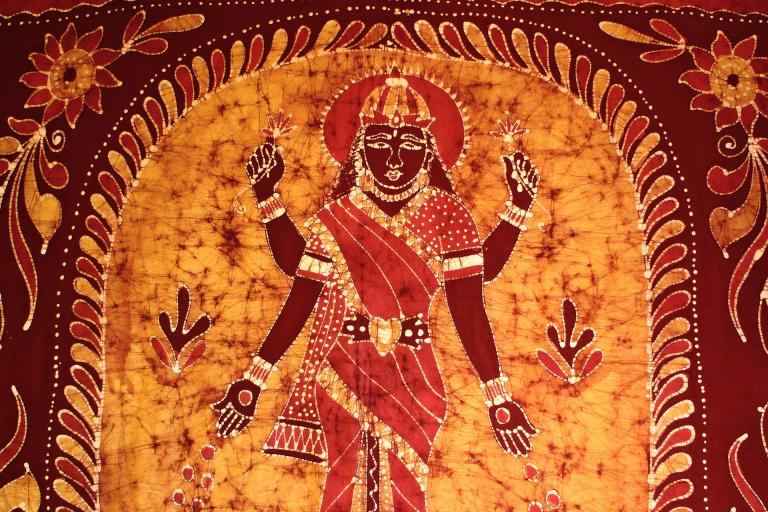One of the few things that sounds odd to me in regular pagan conversations is the reoccurring complaint that people feel disconnected from a particular God or the Gods in general. The sort of thing I am referring to are statements such as, “I am feeling disconnected from X Goddess, what should I do?” “Why don’t I feel X God anymore?”

My thesis as to why this is a thing, why some make these statements, is based upon the failure of expectations. Usually, it seems to be the case that people expect something explicit to happen out of their worship. Like vivid experiences, dreams, physical sensations, intense emotions, the occurrence of something strange. Anything that could be seen as a sign from the God that the worship was ‘accepted’ or liked. When these expectations fail to manifest, that failure becomes evidence to the person that there is a disconnection.
I brought this issue to Twitter, asking specifically for my Hindu followers to answer. As a Greek, I find the Hindu community to be a sort of next of kin; I like to pick their brains on religious matters for comparison. In the tweet, I asked if Hindus ever say, “Geez I feel really disconnected from Lakshmi.” One Hindu wrote in response:
- “Any wealth, in whatever form, is the manifestation of what I worship as Lakshmi Devi.
- To be disconnected with the goddess is not an option. If I am, then she is.
- As long as the “I” exists, the universe/Shakti (let’s not get caught up in semantics) manifests as the mind.”
Another Hindu wrote:
“Yes. I am Indian. I feel this. It’s complicated. Because my faith was attacked in a hundred different ways in the school I went to. And attacked by culture gatekeepers. I was taught to have disdain for my culture & my religion.”

In these two cases, we have one person rejecting the idea of disconnection and another who does experience it. The one who feels a disconnection, though, cites cultural issues such as his faith being “attacked” and the “disdain” that was taught to them. Based on this, I conclude here that the issue is not the Gods, i.e., being present or absent; it has more to do with something personal occurring with the individual, how we understand the Gods, how natural the religion feels to us when we are engaged with it in action.
I have never been able to relate to this sort of feeling of disconnection. When I hear such comments, it sounds a lot like someone who has apathy towards a hobby or is unable to maintain a diet. “Going back on keto” = “starting back up with daily devotions.” If these analogies are comparable, then religious practice is about repetition and dedication. Religion, any religion, is about the things we do, so if we don’t do religion, then people may feel out of whack.
But going back to expectations. This needs to be addressed because even if you are dedicated with worship but have certain expectations that consistently are not being met, then you’ll probably still end up feeling ‘disconnected.’ My rule of thumb is simple – don’t have any expectations. Don’t go looking for signs or strange things to happen, that is not the point of worship, though it is a beautiful gift when it does happen. Physical things have occurred to me, such as the sudden rain after saying the hymn to Zeus, or the barking of dogs after the hymn to Hekate, but these are rare and should not be expected to be normative.

Look at any other religion: do Christians complain of disconnection because nothing happened after they received communion other than a slight buzz? Drop all expectations that there should be a response/reaction from the Gods. The Gods have complete freedom and are not compelled by offerings to act a certain way to satisfy our expectations. If and when something happens, it is of their own accord and is best to be understood as a gift to us. I see these little responses as a slight ‘nod’ from the Gods, and sometimes something humorous happens that I see as the Gods playing with me when I get very serious in worship.
Your ‘disconnection’ may be more profound than the superficial examples I have given. Maybe you do not expect something to happen physically, perhaps you are emotionally unfulfilled by religious activities. Perhaps this is what you feel when you say you are “disconnected from the God” or think they are “absent.”
It is impossible for the Gods to be absent; it is like saying gravity is missing, or I feel disconnected from the air (this may be the case if you are underwater or some other situation – avoid those!). What I think is happening is your awareness of the Gods has changed. We all breathe, but we are not always conscious of our breathing. We are not aware of gravity until we step on a scale. The Sun doesn’t concern us until it burns our skin.

If this is the sort of disconnection you are feeling, try shifting your awareness back to them through study (theory). Read the works of Plato, Hesiod, Plutarch, and others. Allow them to fill you with their wisdom and perspectives to aid in your understanding of the Gods then return to practice.
Many seem to jump into a religious practice without a theory behind what it is that they are doing or are inserting non-Greek theories into Greek practices; that will be problematic. Allow the Greek authors to provide you with the theory behind Who you worship, why you are worshipping, and how to worship – see how that changes things for you.
In the end, the most reasonable thing to expect out of worship is how it makes you feel. If done with a pious heart and a clear mind – worship ought to leave you feeling more harmonious than before. Worship isn’t magic, Gods don’t appear out of thin air; don’t expect voices and other sorts of things. Look to how you feel inside: are you at ease? That ease, that bliss is an indication that something ‘right’ is happening.


















